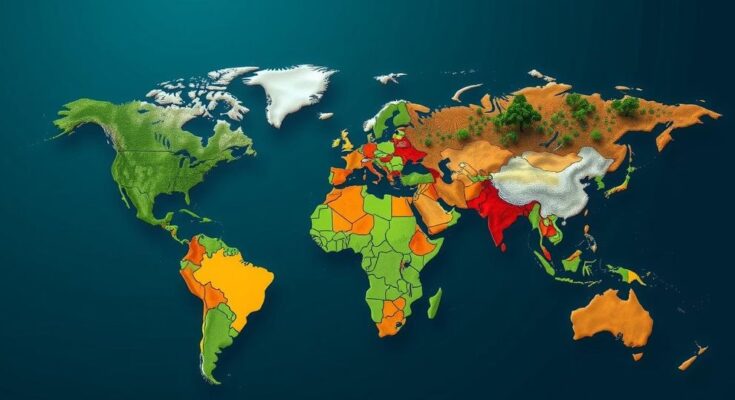The article discusses the impacts of Cyclone Freddy in Malawi, focusing on the introduction of “loss and damage” funding designed to compensate low-income countries for climate change-related disasters. As wealthier nations pledge approximately $720 million for recovery efforts, the initiative highlights the disproportionate suffering of poorer nations despite their minimal contributions to global emissions. Ongoing discussions at the COP29 summit aim to solidify funding mechanisms and responsibilities.
In the wake of Cyclone Freddy, which significantly impacted southern Malawi in 2023, individuals such as Christopher Bingala have received financial assistance aimed at rebuilding their lives. After flooding destroyed his home, Bingala, a subsistence farmer, managed to secure approximately $750 through a newly established compensation system known as “loss and damage” funding, set for vulnerable low-income countries experiencing climate change-related disasters. This initiative stems from a collective agreement by wealthier nations to address the disproportionate impacts of climate change, as poor nations typically contribute minimally to global emissions yet endure severe consequences. As of now, around $720 million has been pledged from countries including the United States and the European Union, yet experts caution that this amount is insufficient in combating escalating climate-related challenges.
At the ongoing COP29 climate summit in Baku, Azerbaijan, negotiations are underway to determine compensation for developing countries as part of a broader climate finance package. Philip Davis, Prime Minister of the Commonwealth of the Bahamas, articulated hope for accountability from developed nations to fulfill their responsibilities in addressing the adverse outcomes of their emissions. Cyclone Freddy generated substantial devastation across Malawi, displacing approximately 650,000 people, forcing many into temporary accommodation and leaving local communities in dire need of assistance.
The payment received by Bingala, funded by the Scottish government, represents a pioneering effort to directly address the recovery needs of the most affected individuals. Disbursed by the non-profit GiveDirectly, these funds have reached several families in Malawi, enabling them to rebuild homes or invest in agricultural resources. The vulnerability of low-income households to extreme weather events is highlighted by the stark absence of insurance or financial protection options. This pilot initiative in Malawi serves as a model for future funding mechanisms aimed at transferring resources to nations that have contributed least to climate change yet are most affected.
As the urgency for adequate funding grows, Prime Minister Davis noted the escalating national debt linked to recovery efforts after severe weather events. With only limited funds officially mobilized thus far, the challenges persist as countries formulate guidelines on fund allocation. Low-income nations assert that financial assistance should transcend mere disaster recovery, advocating for proactive measures that could include village relocations and the preservation of critical ecological sites. Experts predict that the financing needs for loss and damage could soar to approximately $250 billion per year by 2030, emphasizing the necessity for wealthier nations to engage in responsible and enlightened participation to help prevent widespread humanitarian crises.
The dialogue surrounding loss and damage financing reflects a critical juncture in global climate policy, underscoring the need for equitable solutions that address historical injustices and foster resilience in vulnerable communities.
The concept of “loss and damage” funding emerged from discussions within international climate negotiations as a critical response to the impacts of climate change on low-income countries. These nations frequently suffer severe disasters while contributing minimally to global greenhouse gas emissions. The growing frequency and intensity of climate-related events necessitate a structured approach to compensate affected communities, enabling them to recover and rebuild. This initiative aligns with the broader goals of climate finance, aiming to provide both immediate relief and long-term resilience against future environmental changes.
In conclusion, the recent advancements in loss and damage funding illustrate a noteworthy effort to support vulnerable communities disproportionately affected by climate change. While significant pledges have been made, there remains a pressing need for swift action and greater financial commitments from wealthy nations. The dialogue at COP29 underscores the importance of accountability and proactive measures to ensure that developing countries receive the necessary assistance to mitigate future climate-related disasters and enhance their resilience.
Original Source: www.waer.org




